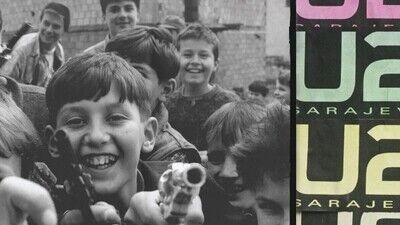From there, Cicin-Sain makes U2 a central focus for a few stretches of the film, and rightfully so. After all, the band landed on the front page of every newspaper in every city they visited while on tour. So, they decided to use that coverage to bring more attention to the war-torn streets of Sarajevo by doing live interviews with its citizens during their show. Carter hosted the interviews, many of whom tell their stories in this film, while Bono would talk to them in front of thousands of fans. Finally, because of this gesture, people in the media grew more aware. But Cicin-Sain doesn’t hold U2 up too high on the pedestal for this. Everyone in the U2 camp agreed on the flaw in this design: it really didn’t rouse people to enact change. One interview, in particular, brought a U2 show to a screeching halt, as a woman asked Bono, “What are you really doing for us? I think nothing.” “The Greatest Night in Pop” might play a little differently after watching this.
Many years later, though, U2 fulfilled their promise to play a show in Sarajevo as part of their PopMart Tour in 1997-98, a show which serves as a climax for the film and the symbolic end to the war for many. U2’s fans (myself included) will make up a large chunk of the audience for this film, but Cicin-Sain knows that the bigger story here is how not just art, but normalcy and joy, can be used to combat those in power who seek to destroy and oppress. Nobody’s music or art or humor helped end the war or stop bullets from flying, but to be a participant or audience member at any show or beauty pageant of any kind felt like enough of an F.U. to everyone in power. Sometimes that’s enough.
To U2’s credit, they insisted this film not be about them, but about the people of Sarajevo. Cicin-Sain does his best to maintain that balance, but the emotional payoff at the end might resonate with fans more than the casual viewer. “Kiss The Future” doesn’t take any stylistic risks and doesn’t add anything new to the documentary form. It’s pretty straightforward in its approach and we know there will be a “how this is relevant today” message by the film’s end. Luckily, Cicin-Sain keeps the obvious parallels to a minimum during the film’s closing so that we are not left with just anger, fear and crippling hopelessness as we look ahead to the 2024 election year and all the international strife currently unfolding. “Kiss The Future” uses hope, joy and love of art as its foundation for building its thesis on how the arts unifies, how it scares people in power and how it helped rebuild a city you’ll want to visit after seeing this film. The “DON’T LET THEM KILL US” sign is not just a plea to the rest of the world outside Sarajevo, but to the citizens themselves.
Opens on February 23rd with some special screenings February 21st in some markets.

